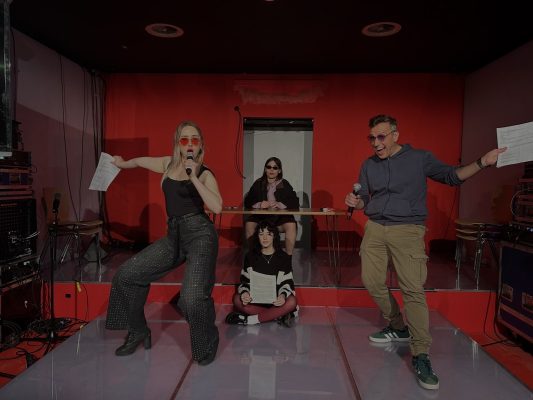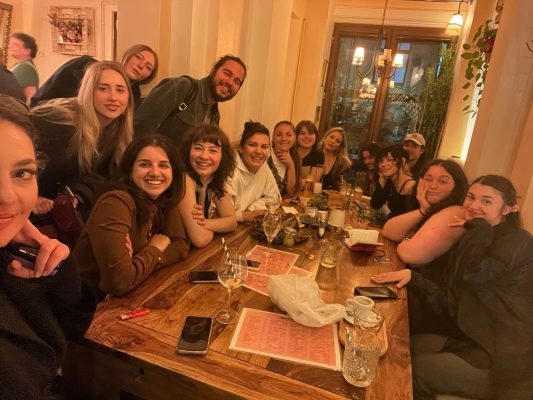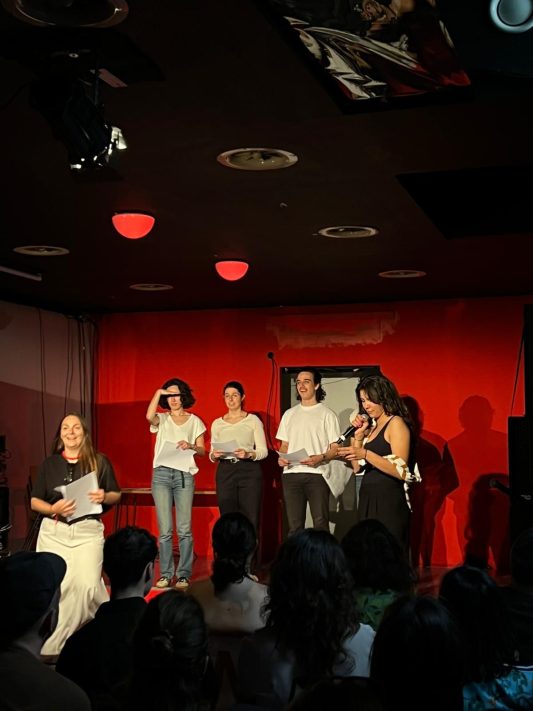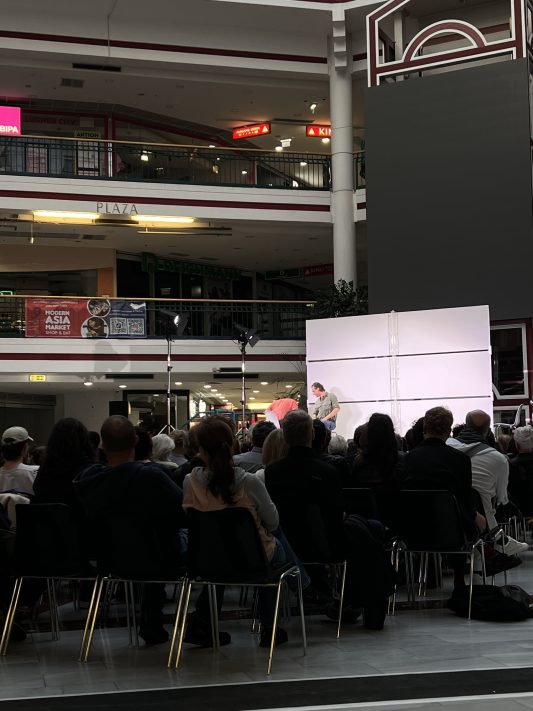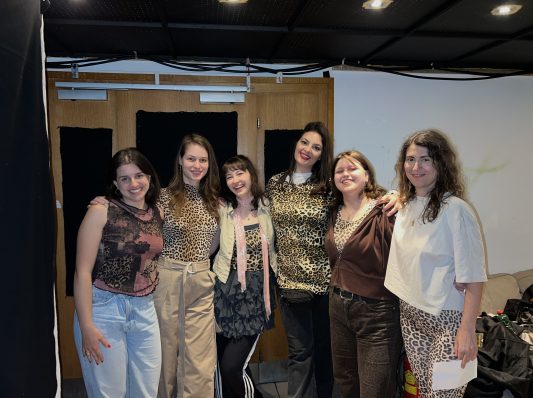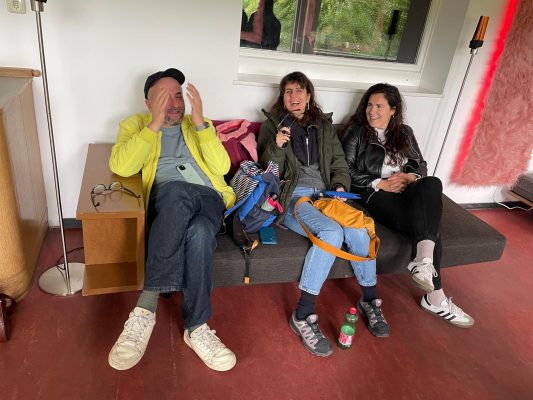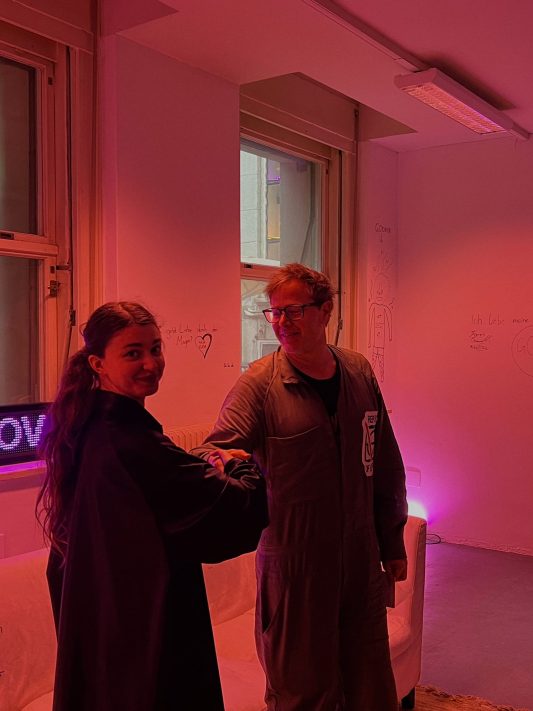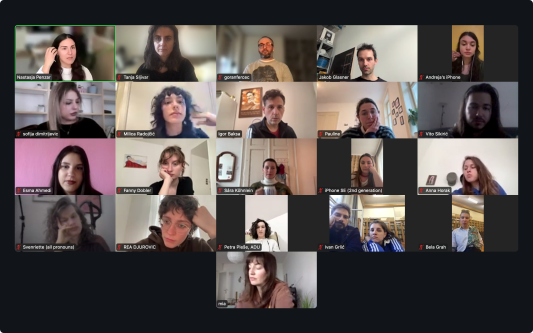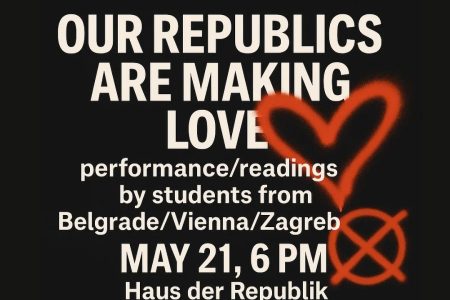
OUR REPUBLICS ARE MAKING LOVE
OUR REPUBLICS ARE MAKING LOVE
Aplied Love
Erasmus+ Blended Intensive Programme
Location: ORF Funkhaus, Vienna
Host: University of Applied Arts Vienna
Partners: University of Zagreb, Academy of Dramatic Arts and University of Arts in Belgrade, Faculty of Dramatic Arts
Timeline: virtual component March – June 2025 and physical mobility May 17–23, 2025
The Erasmus+ BIP program we attended was a blended mobility program (combining online and in-person participation) co-organized by two sending institutions – the University of Arts Belgrade (Faculty of Drama Arts) and the University of Zagreb (Academy of Drama Arts) – and one host institution – the University of Applied Arts in Vienna, through its creative writing department – the Institut für Sprachkunst. This was a very specific type of exchange program: in addition to five of us, Belgrade-based students and our professor, doc. Tanja Šljivar, who participated through the teacher’s traineeship program, two more mentors, doc. Goran Ferčec and Prof. Dr. Nastasja Penzar took part as well, alongside around 30 students from Zagreb and Vienna.
Such a constellation meant that considerable attention had to be paid to inter-group dynamics, especially in the process of preparing the final performance, which was the culmination and outcome of the whole program. We are all MA students of theater directing and dramaturgy at the Faculty of Drama Arts in Belgrade, while Zagreb and Vienna students came from various study levels (BA and MA), and different backgrounds and artistic disciplines, including acting, theater directing, video art, prose and playwriting, social design, and more. These differences in our experiences and approaches, both individual and group-based, alongside everyone’s different working modalities and habits, significantly influenced our overall exchange experience.
Tanja Šljivar and her co-mentors, Ferčec and Penzar, all come from writing-based backgrounds, but through this BIP experience, they had the opportunity to share ideas and learn from each other, especially in terms of teaching styles and feedback methodologies, in such a highly sensitive group and specific artistic environment, made even more complex by the tight schedule.
The final performance evening was co-produced with a fourth, non-academic partner – Wiener Festwochen, Austria’s biggest theatre and performance festival. The venue was the ORF Funkhaus Wien, also serving as the festival centre. It was an immense experience of simultaneously presenting our artistic work to the broader festival audience while also stepping out of our usual creative comfort zones. Those of us who are accustomed to working alone had to collaborate with colleagues; those who were used to making all the key artistic decisions had to relinquish some control. Some performed for the first time, while others wrote their first short performative texts. The evening was a success!
Additionally, the collaboration with colleagues from other countries, Croatia and Austria, was valuable not only for the exchange of ideas and getting to know each other, but also for gaining insight into their working processes, artistic practices, and professional approaches. During the preparation of the performance, we had the opportunity to try out different roles, from producers and organizers to directors and even performers. This presented a particular challenge and a completely new experience for many of us coming from writing-based backgrounds. As important as international networking was, just as meaningful was the daily exchange and closer collaboration with fellow students from our Faculty. At a time when solidarity within the artistic community in Serbia is of crucial importance, this kind of mutual support and togetherness proved to be invaluable.
For us, as dramaturges and directors, it was especially important to witness firsthand how initial ideas and concepts evolve when confronted with altered circumstances. However, it was precisely this experience that helped us improve our practical skills and refine specific dramaturgical and directorial elements, such as text editing and adaptation, as well as spatial design and staging.
A special add-on was Andreja Kargačin’s reading-performance, which featured a public reading of a letter addressed to the festival’s artistic director, Milo Rau. The performance responded to Rau’s speech at the opening of the BITEF festival in 2024 and addressed its impact on the subsequent cultural funding cuts in Serbia. It was also a homage to Tanja Ostojić’s work “I will be your angel” (Venice Biennale, 2001), so the piece is now called “After Tanja Ostojić”. This performance resulted in starting the ongoing conversation between BITEF, Wiener Festwochen, and others.
Overall, the scope of the exchange with such a high number of fellow students enabled us to strengthen our international artistic and academic networks, to promote Serbia’s current student movement and protests, and to gain valuable insight into some of the contemporary tendencies in the performing arts by attending various evening performances. This was also the first time that our Faculty, together with one of its professors, Ms. Šljivar, co-organized a BIP Erasmus+ program.
The week spent in Vienna – as well as the two months of online preparatory sessions, lectures given by mentors, and work on our pieces for the Funkhaus performance, was an enriching academic and artistic experience, one that we particularly cherished during these unprecedented times our country is facing.
Sofija Dimitrijević
Ana Janković
Andreja Kargačin
Isidora Milosavljević
Milica Radojčić
Tanja Šljivar, doc.
